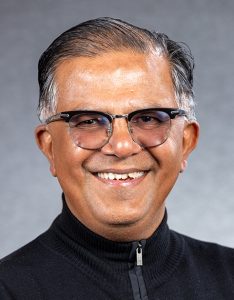By Wayne Gillam | UW ECE News

UW ECE alumnus and Affiliate Professor Jai Jaisimha (Ph.D. ‘96) has co-founded a new nonprofit organization, the Transparency Coalition.ai, which is advocating for transparency and regulation of the data used to train artificial intelligence. / Photo by Igor Omilaev, courtesy of the Transparency Coalition.ai
Artificial intelligence holds great promise as well as possible peril for society. This rapidly evolving technology stands to accelerate advances in science, engineering, and healthcare as well as improve efficiency and productivity in a vast range of industries. But AI also has serious downsides, which include the potential to spread misinformation and disinformation online, exacerbate algorithmic biases, compromise individual privacy, and even obliterate copyright protections for intellectual property.
It is the peril of AI that drew the attention of UW ECE alumnus and Affiliate Professor Jai Jaisimha (Ph.D. ‘96), who has worked as a technology entrepreneur for decades and has held leadership positions in major tech companies that leverage AI, such as Amazon and Microsoft. Now, along with his co-founder Rob Eleveld, Jaisimha has created a new nonprofit organization, the Transparency Coalition.ai, which seeks to address these concerns by advocating for greater transparency and regulation of the data used to train and inform AI and generative AI models, such as ChatGPT.
“Rob and I were concerned about the rollout of generative AI and how it was going. We were already seeing evidence of societal harm. And we knew that we had the expertise needed to help address some of these issues,” Jaisimha said. “Because of my work in computer vision and imaging when I was at the UW, I spent years studying and understanding pattern recognition, how it worked, and the mathematics behind it. I built early versions of these AI models that are similar to the ones that are out there now.”

UW ECE alumnus and Affiliate Professor Jai Jaisimha
The roots of Jaisimha’s knowledge about AI models and the data used to train them goes back to his time as a doctoral student working with his adviser, UW ECE Professor Emeritus Eve Riskin, who is now the dean of undergraduate education in the electrical and computer engineering department at the Stevens Institute of Technology. With oversight by Riskin, Jaisimha applied statistical pattern recognition techniques to better understand datasets and how to use them to make online browsing a more interactive and personalized experience. During this time, he also had an internship at a startup that did research for government agencies, which taught him the importance of data curation as well as algorithmic model construction, testing and validation.
These experiences as a student carried over into his professional life, which has been defined by his entrepreneurial ventures and corporate leadership.
“When you’re building a company, it’s not just about making a cool demo,” Jaisimha said. “It’s about making sure you have the entire pipeline of AI model building in place: data collection, data cleansing, being rigorous about validating and testing your results, and automating performance monitoring. That way, you end up building a robust system. Those are all things I learned at UW ECE.”
The Transparency Coalition.ai
According to Jaisimha, there is a large amount of research available about ethical and responsible AI development, and many companies have even formed entire departments focused on the ethical implementation of AI in their products. However, profit incentives have interfered with these good intentions. Teams focused on ethical AI in companies are often shrunk or even shut down. And thoughtful research in this area is too often ignored by industry leaders in favor of getting products to market faster and increasing profits.
Jaisimha and his colleagues at the Transparency Coalition.ai believe that the government has an important role to play in regulating AI and providing needed oversight in a highly competitive marketplace. They have chosen to focus their efforts on advocating for greater transparency in AI training data, which Jaisimha believes is key to promoting more ethical and responsible AI development.
Jaisimha said that focusing on AI training data is important because today’s generative AI models are ingesting large amounts of uncurated data. This includes copyrighted material and content behind paywalls, in social media and on personal websites, and even illicit and illegal content, such as child pornography. This indiscriminate ingestion of large amounts of uncurated data makes generative AI systems prone to frequent and well-documented “hallucinations,” where the system provides warped images or wrong and misleading answers when prompted.
“Because I’m an affiliate professor in UW ECE, I’ve been able to tap into the wider UW ecosystem, whether it’s the RAISE group, or computer science and engineering, or linguistics, or law. There’s a lot of good thinking happening across the university, and I’m looking for ways to bring it forward to legislators and to the public.” — UW ECE alumnus and Affiliate Professor Jai Jaisimha
In contrast, a generative AI model with a transparent, curated dataset is less prone to hallucinations, greatly reduces the risk for societal harm, and is customized for solving specific problems. In many cases, the curation of training data also optimizes the AI model to accomplish tasks more efficiently. Because of these facts, Jaisimha believes that transparent, regulated, and curated AI training data will not only be good for society, in the long-term, it will be good for business too.
“If you want to solve real-world problems, you have to embrace the idea of either taking these big, generative AI models and refining them for a specific application or building the model in a way that acknowledges that need for customization from the beginning,” Jaisimha said. “We know it’s possible to implement some degree of constraint on AI training data. And I believe the result will be a thriving ecosystem of companies building technologies that will be more practical, useful, and focused on solving real-world problems.”
The Transparency Coalition.ai has set its sights on state-level advocacy, and it is reaching out to legislators in Washington and California. According to Jaisimha, state governments can often move to implement policy more rapidly than the federal government. Washington and California are also headquarters for a high number of leading technology companies working with artificial intelligence, which widens the impact of policies and legislation enacted in these states nationally and internationally.
Since its founding in October 2023, the Transparency Coalition.ai has already scored a significant victory. A bill establishing a new AI Task Force for the state of Washington was signed into law by Governor Jay Inslee last month. Among its other mandates, the Task Force will be considering appropriate regulation for AI training data, which is something the Transparency Coalition.ai advocated for among legislators involved in establishing the group.
At the UW, Jaisimha is collaborating with Professor Chirag Shah in the UW Information School, who runs the Responsibility in AI Systems and Experiences, or RAISE, team at the University. RAISE conducts high-quality research on ethical and responsible AI development, and Jaisimha is connecting the organization with Washington state legislators through the Transparency Coalition.ai to help better inform AI policy and regulation.
UW connections
Jaisimha became a UW ECE affiliate professor in September 2023, and going forward, he plans to retain and continue to grow his connections at the UW. In addition to being affiliated with RAISE and advising student teams in the Department’s Engineering Innovation and Entrepreneurship capstone program, known as ENGINE, he is involved in CoMotion at the UW. There, he is a mentor for students and faculty and is actively involved in the CoMotion Innovation Gap Fund, which helps to move UW inventions and innovations into commercial investment and development. Jaisimha also has several family connections to the University. His wife received her master’s degree in business administration from the Foster School of Business, and their eldest son will be graduating this year from UW ECE with a bachelor’s degree. Their youngest son is a sophomore studying informatics at the UW iSchool.
“We say in our family that we ‘bleed purple.’ The four of us are deeply connected to the UW, and I have a strong sense of needing to pay it forward,” Jaisimha said. “I see both my affiliate work at UW ECE and my mentorship work at CoMotion as a form of giving back. The Transparency Coalition.ai is also a form of giving back to the community.”
Jaisimha encourages students pursuing careers in AI development to not worry too much about whether what they are studying now will remain relevant in this fast-changing world. Instead, he notes there is a specific way of breaking down problems that engineering students learn, which is a useful skill to apply in many situations. He also recommends that students interested in AI explore edge technology, such as TinyML, which brings machine learning networks into resource-constrained devices. And he suggests that students consider taking statistics classes, which can help an ECE graduate stand out in fields related to AI and machine learning.
In regard to his work with the Transparency Coalition.ai, Jaisimha and his co-founder are continuing their outreach to state legislators and seeking donor support for their efforts. He encourages everyone who can to get involved and contact their state legislators to let them know about the need for AI transparency and oversight. To this end, the Transparency Coalition.ai recently installed a bill tracker on their website, which helps make it easy for people to see what bills related to AI are active in their state. Jaisimha also plans to continue to bring pertinent information about AI development to government officials going forward.
“Because I’m an affiliate professor in UW ECE, I’ve been able to tap into the wider UW ecosystem, whether it’s the RAISE group, or computer science and engineering, or linguistics, or law. There’s a lot of good thinking happening across the university, and I’m looking for ways to bring it forward to legislators and to the public,” Jaisimha said. “I’ve never stopped educating myself. Now that I’m back at the UW, I’m continuing my education and benefiting from being at one of the greatest institutions in the world.”
For more information about UW ECE Affiliate Professor Jai Jaisimha and his advocacy work, visit the Transparency Coalition.ai website.

